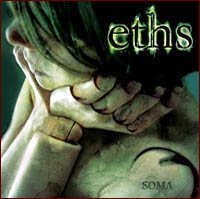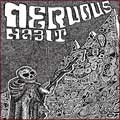ETHS (FRA) - Sôma (2004)

Label : Sriracha Records
Sortie du Scud : Octobre 2004
Pays : France
Genre : Thrash Hardcore
Type : Album
Playtime : 12 Titres - 62 Mins
Il est bien difficile de coller une étiquette à ETHS, tant les univers musicaux qui leur servent de creuset semblent s’entremêler pour aboutir à un résultat inclassable et résolument original. Tantôt émotion, tantôt violence pure, il n’est pas possible de tirer un trait de séparation entre ses deux tendances car souvent l’émotion surgit là où on ne l’attendait pas, le groupe réalisant l’exploit de véhiculer des sentiments contradictoires. C’est donc une jolie performance, surtout à une époque où tant de groupes se contentent de suivre des schémas. Vous l’avez compris, ETHS c’est du gros talent !
Impossible de parler d’ETHS sans évoquer le chant de Candice. Et là je serai très clair : appelez un exorciste ! Le chant guttural est asséné avec une foi qui confère à la démence. Mais le vrai choc est ailleurs : elle exploite l’ensemble de son registre vocal pour véhiculer son message. Elle susurre, elle hurle, elle parle ou elle chante en clair, en alternant les genres comme si sa voix était un instrument à part entière s’adaptant à la perfection aux mouvements de la musique. Il y a parfois plus de violence lorsque Candice reprend son souffle que lorsqu’elle crie, comme sur « 8 » où la féminité de sa voix perce à travers les cris. Aucune dictature du chant, le groupe regarde ensemble dans la même direction.
Musicalement c’est aussi doux qu’un coup de poing dans la gueule, et si vous vous attendez à écouter du EVANESCENCE, vous risquez de perdre tous vos cheveux d’un seul coup !
Reuno et Phil de LOFOFORA font une apparition sur « Ailleurs C’Est Ici » ; on pouvait craindre un petit coup de pouce marketing, mais leur intervention est très judicieuse et le titre est vraiment mortel.
Sôma est incontestablement une nouvelle étape pour les marseillais. Espérons que le succès (mérité) sera au rendez-vous.
Ajouté : Mardi 21 Septembre 2004
Chroniqueur : Alexis de Fireball
Score :     
Lien en relation: ETHS Website
Hits: 25565
|














